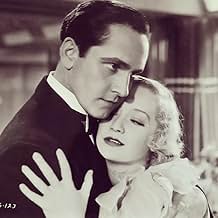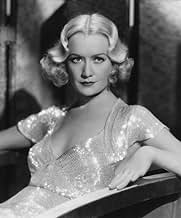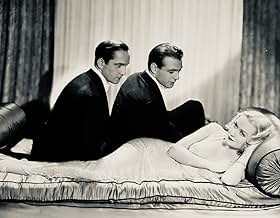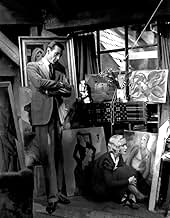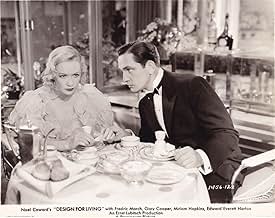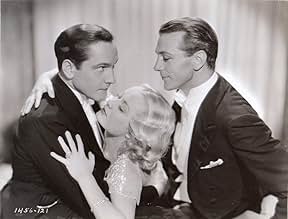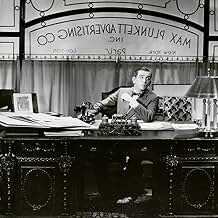AVALIAÇÃO DA IMDb
7,4/10
8 mil
SUA AVALIAÇÃO
Uma mulher não consegue decidir entre dois homens que são apaixonados por ela, e o trio concorda em tentar viver juntos em um amigável relacionamento platônico.Uma mulher não consegue decidir entre dois homens que são apaixonados por ela, e o trio concorda em tentar viver juntos em um amigável relacionamento platônico.Uma mulher não consegue decidir entre dois homens que são apaixonados por ela, e o trio concorda em tentar viver juntos em um amigável relacionamento platônico.
Cosmo Kyrle Bellew
- Man
- (não creditado)
Lionel Belmore
- Theatre Patron
- (não creditado)
Thomas Braidon
- Douglas' Second Manager
- (não creditado)
Nora Cecil
- Tom's Secretary
- (não creditado)
Emile Chautard
- Train Conductor
- (não creditado)
Mathilde Comont
- Heavy Woman
- (não creditado)
Adrienne D'Ambricourt
- Cafe Proprietress
- (não creditado)
James Donlan
- Fat Man with Ring
- (não creditado)
Harry Dunkinson
- Mr. Egelbauer
- (não creditado)
Estelle Etterre
- Woman in audience
- (não creditado)
- Direção
- Roteiristas
- Elenco e equipe completos
- Produção, bilheteria e muito mais no IMDbPro
Enredo
Você sabia?
- CuriosidadesConsiderable censorship difficulties arose because of sexual discussions and innuendos, although the Hays Office eventually approved the film for release. However, the film was banned by the Legion of Decency and was refused a certificate for re-release by censor Joseph Breen in 1934 when the Production Code was more rigorously enforced.
- Erros de gravaçãoCamera shadow visible on window frame as Gilda sets the table.
- Citações
Max Plunkett: Immorality may be fun, but it isn't fun enough to take the place of one hundred percent virtue and three square meals a day.
- ConexõesFeatured in Complicated Women (2003)
- Trilhas sonorasThe Star Spangled Banner
(1814) (uncredited)
Music by John Stafford Smith
Hummed by Gary Cooper and Fredric March
Avaliação em destaque
Intelligent script, witty dialogue, sexy stars, sophisticated story, deft direction…What more can I say? It's Lubitsch and Paramount at its Pre-Code best! This was another of those "vintage" films of which you had the chance of reading a lot about, but before Universal released "The Gary Cooper Collection", where it's included, you had nowhere to watch it. Of course, I bought promptly the aforementioned set.
The picture tells the story of free-spirited Gilda Farrell, a young lady who works at a Parisian Advertising Agency, managed by that great seasoned pro, Edward Everett Horton, who by chance meets on board a train, struggling, penniless, artists George Curtis, a painter (Gary Cooper) and Thomas Chambers, a playwright (Fredric March), in which may be one of the most "risqué" plots of all the Pre-Code Era, dealing openly with the pros and cons of a mènage-a-trois.
Miriam Hopkins portrays the deliciously mischievous Gilda, giving a top, tongue-in-cheek performance, looking absolutely beautiful and full of glow from within; it's really in her films directed by Lubitsch that her appeal shines at its most and she looks at her attractive-best.
Fredric March is good too as the "more down-to-earth-but-nevertheless-madly-in-love" playwright, who lives with buddy Gary Cooper in a miserable tenement, until Miriam Hopkins comes in scene and to "the rescue".
But the revelation, in my opinion, is Gary Cooper; after seeing him in many of his 1930s films, I feel that I like him best in the variety of roles he got to play in those years: a young idealist in "Peter Ibbetson", a sensitive soldier in "A Farewell to Arms", a sophisticated artist in this one, etc. He really was a good actor from the beginning of his "talkies" career (I haven't seen his Silents, so I cannot give an opinion), showing much skill and depth in his interpretations. In this film he plays excellently opposite such strong talents as Miriam Hopkins and Fredric March, absolutely "a la par".
In all, a highly enjoyable film. Smart Entertainment. A must.
The picture tells the story of free-spirited Gilda Farrell, a young lady who works at a Parisian Advertising Agency, managed by that great seasoned pro, Edward Everett Horton, who by chance meets on board a train, struggling, penniless, artists George Curtis, a painter (Gary Cooper) and Thomas Chambers, a playwright (Fredric March), in which may be one of the most "risqué" plots of all the Pre-Code Era, dealing openly with the pros and cons of a mènage-a-trois.
Miriam Hopkins portrays the deliciously mischievous Gilda, giving a top, tongue-in-cheek performance, looking absolutely beautiful and full of glow from within; it's really in her films directed by Lubitsch that her appeal shines at its most and she looks at her attractive-best.
Fredric March is good too as the "more down-to-earth-but-nevertheless-madly-in-love" playwright, who lives with buddy Gary Cooper in a miserable tenement, until Miriam Hopkins comes in scene and to "the rescue".
But the revelation, in my opinion, is Gary Cooper; after seeing him in many of his 1930s films, I feel that I like him best in the variety of roles he got to play in those years: a young idealist in "Peter Ibbetson", a sensitive soldier in "A Farewell to Arms", a sophisticated artist in this one, etc. He really was a good actor from the beginning of his "talkies" career (I haven't seen his Silents, so I cannot give an opinion), showing much skill and depth in his interpretations. In this film he plays excellently opposite such strong talents as Miriam Hopkins and Fredric March, absolutely "a la par".
In all, a highly enjoyable film. Smart Entertainment. A must.
- fsilva
- 27 de jun. de 2005
- Link permanente
Principais escolhas
Faça login para avaliar e ver a lista de recomendações personalizadas
Detalhes
- Data de lançamento
- País de origem
- Idiomas
- Também conhecido como
- Design for Living
- Locações de filme
- Empresa de produção
- Consulte mais créditos da empresa na IMDbPro
Bilheteria
- Faturamento bruto mundial
- US$ 157
- Tempo de duração1 hora 31 minutos
- Cor
- Proporção
- 1.33 : 1
Contribua para esta página
Sugerir uma alteração ou adicionar conteúdo ausente

Principal brecha
By what name was Sócios no Amor (1933) officially released in India in English?
Responda

